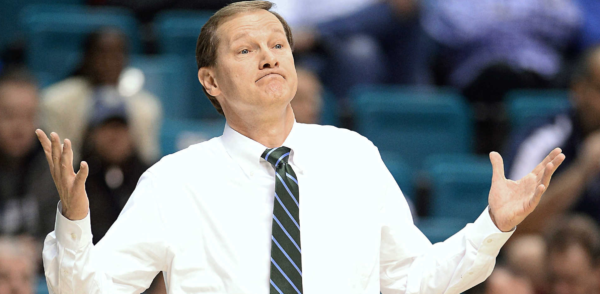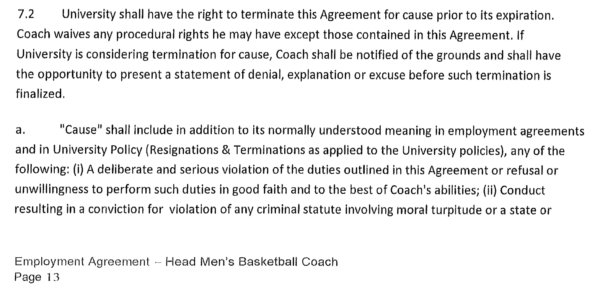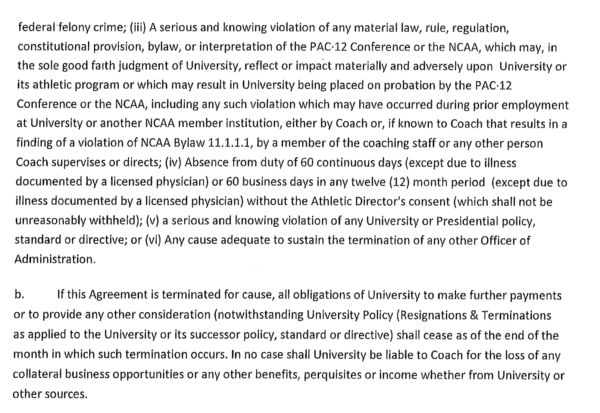12/12/2017: From the Oregonian, and also in the WaPo: Oregon’s Board of Examiners for Engineering and Land Surveying unconstitutionally applied state law governing engineering practice to Mats Järlström when he exercised his free speech about traffic lights and described himself as an engineer since he was doing so “in a noncommercial”…
UO Matters
12/11/2017 update: “At no time was I, or my agents, made aware of any of the complaints listed in Ms. McCoy’s timeline, with the exception of the dog scratches on the floor in 2015,” he wrote. So the grits were just a decoy. In the end it was all about…
Hard to believe this was just 4 years ago. Gottfredson fired Geller a few months later over the Altman basketball cover-up, and he went to work for Harrang et al., which is now down to 17 lawyers from a peak of 40 or so. Subject: [Cas-infoshare] Work schedule for bargaining unit…
Just kidding. While new Duck football coach Mario Cristobal is obviously very grateful to the Duck football players who lobbied Rob Mullens and got him the job, there is no evidence that he plans to use untraceable cryptocurrency transfers to share even a dime of his $2.5M salary with them.…
Senator Wyden is gonna be pissed:

UO student reporter Kenny Jacoby, who broke the story, has the latest scoop in Sports Illustrated here. A snippet:
… According to UO spokesman Tobin Klinger, it is the school’s practice not to notify coaches when student-athletes are accused of sexual assault so as not to risk “tainting investigations.”
Yet Altman’s cell phone records, which SI obtained under the Freedom of Information Act, reveal the coach was enmeshed in Bigby-Williams’s case from the beginning.
In the first 48 hours after school officials learned of the police investigation into Bigby-Williams, Altman had five phone calls with Lisa Peterson, the school’s deputy Title IX coordinator, and another four phone calls with Bigby-Williams’s former coach at Gillette College, Shawn Neary. Both Peterson and Neary had direct knowledge of the criminal investigation into Bigby-Williams, and UO failed to disclose these contacts both to SI and in its letter to U.S. Senator Ron Wyden of Oregon, who demanded more information about UO’s handling of the case in response to SI’s reporting. …
Read it all. Meanwhile there’s an excellent op-ed in the Emerald, asking how it is that Coach Altman’s player never even got called in for a student conduct code investigation despite the rape allegation, while students who disrupted President Schill’s State of the University Address got questioned by the Student Conduct Office for liking the protest on Facebook.
I’d say that there’s plenty here to fire Dana Altman for cause, but instead Rob Mullens will probably give him another raise. Contract here.


11/4/2017 update:
For the confused, here’s a link to today’s interview with Kenny Jacoby, the reporter who broke this story on OPB’s Think Out Loud. They discuss the incident, where UO’s response went wrong, and the reporter-blaming in UO’s letter to Wyden.
And, from back in 2014, here’s a link to a KATU story on the UOPD’s response to the 2014 incident. The UOPD asked for the EPD report, the EPD detetective said no, and the UOPD detective – the same detective who did not forward the Wyoming police report to the Title IX office this time – congratulated the EPD detective for not giving it to the UOPD, saying
“That was exactly the right decision,” Flynn says in the voicemail, “and what should have been done and we’re trying to keep people from being hysterical over here because they’re being hysterical and wanting to do stupid things.”
True enough.
11/14/2017 update: OSU gang-rape survivor Brenda Tracy not impressed by Schill’s response to Wyden:
Dec 8th, 8 AM Meeting of the Board — [Materials] [Webcast] – Call to order, roll call, verification of quorum – Approval of September and October 2017 minutes (Action) – Public comment 1. Standing Reports -ASUO President Amy Schenk -University Senate President Chris Sinclair -Provost Jayanth Banavar -President Michael Schill 2. Seconded…
12/7/2017: All the cash and apparel goes to the Duck Athletic department, except for a cut of the royalties for the academic side. Academic Departments will have to contract with Nike if they want to sell t-shirts. More details in the Register Guard here: Stanton said that the additional money from…
This is the Dec 7 committee meetings. Dec 8th board meeting is above. Update: I’ll fix these links and add some live-blogging during the meetings today and tomorrow. They scheduled their last meeting during summer break, to coincide with a Duck football game. So I suppose this is a D+…
It looks like a busy meeting for their Executive and Audit Committee. Presidential Assessment, Audit report, Annual reports from the GC, Compliance, Ethics, etc. Here’s their agenda, with handy links: 1. Call to Order/Roll/Declaration of a Quorum (Borkar) 2. Consent Item a. Minutes of the July 20, 2017 Executive & Audit…
Update: In the Oregonian, here: … The narrative will be that Taggart went 7-5 in his first season and he and his agent, Jimmy Sexton, baited Oregon into a bidding war with Florida State that resulted in a six-year, $30 million windfall. But the reality is, the Ducks didn’t do…
12/3/2017: That’s according to Andrew Nemec in the Oregonian here, who thinks this will be a disaster for recruiting. The Las Vegas Bowl is run by ESPN, so there’s no public information on how much the organizers rake in. With any luck UO’s take, after the expenses for team travel and the junkets for top JH and Senate administrators and families, will be enough to cover the $500K we paid Southern Utah for the body-bag game that gave Willie Taggart a winning season and a $100K bonus. Who goes and what it costs will be available under Oregon public records law however, since “what happens in Vegas stays in Vegas” is not yet listed as a mandatory exemption under ORS 192.
2016: Losing season, no bowl game.
12/28/2015: UO cuts Bowl of Ducks list to the bone
Two and a half weeks after asking, UO’s Public Records office responds to a request for the Alamo Bowl junket list:
No University employees will be receiving paid “junkets” to the Valero Alamo Bowl on January 2nd. However, the following University employees will be travelling to the Alamo Bowl as a part of the official delegation, and will be expected to perform work on behalf of the University.
Mike Andreasen
Roger Thompson
Tim Gleason
Rob Mullens
Randy Sullivan
The office considers this to be fully responsive to your request, and will now close your matter. Thank you for contacting the office with your request.
12/6/2017 update: Or maybe they Judge will hear it after all. From the Oregonian: A Benton County judge has ordered Oregon State University to halt termination proceedings against a longtime professor accused of sexual harassment and bullying. The order signed late Tuesday by Judge Matthew Donohue arrives days before the university’s…
Update with text as passed by the UO Senate:
After a full, frank, and extended discussion led by Senate President Sinclair (Math) – with UO President Schill, Provost Banavar, and many UO Collective students present – the Senate voted 23-21 today to pass a revised version of US17/18-02: RESOLUTION TO SUPPORT THE UO STUDENT COLLECTIVE. This resolution was regarding disciplinary charges for Student Conduct Code violations brought by the administration against students who had protested at, and disrupted, President Schill’s October 6th State of the University Address.
This resolution had been presented to the Senate and posted on its website for review two weeks ago. Yesterday afternoon President Schill and Provost Banavar sent a letter to the Senate responding to it. The UO Student collective took this response to heart, in part, and redrafted their motion last night and this morning, taking out some of the parts the President and Provost found objectionable and making general edits and explanation. The Senate received that revision shortly before the meeting today.
The revised resolution was considered under a suspension of the normal rules, given the fact that time was of the essence, since the Student Conduct Office had given the students charged with disciplinary violations a firm deadline of December 8th to decide on how to respond to the charges, the students had exams, and that the next Senate meeting was not until January.
After voting to suspend the rules with the required 2/3 majority, a motion was then made to divide the resolution, separating the parts on the student conduct process from the parts asking the administration to condemn speech by white supremacists. This passed with considerable support.
The Senate then spent about 30 minutes discussing the student conduct part of the resolution. The resolution was read out in its entirety twice – once before division, and once after.
Some Senators urged the Senate to delay, arguing that this was too little time to consider. Others argued that the students had been given a deadline and the Senate needed to act today.
Provost Banavar asked the students if they would be satisfied if the administration would extend the Dec 8th deadline. The students asked if the Provost could promise such an extension. He said he could not.
Senate VP Harbaugh (me) relayed that he had just been told by the Dean of Students that the Student Conduct Office had failed to make recordings or verbatim transcripts of the student conduct hearings held so far (and had prevented the students from making recordings), despite that fact that verbatim transcripts were required for appeals of conduct violations. Whoops.
The Senate extended the time for debate several times. One OA Senator said that the OA’s would feel that passing the resolution would be taken as an attack on the OA’s who have the difficult job of enforcing student conduct code violations. This was received with respect.
One Senator, from the law school, argued for delay and more deliberation, until next quarter. This same Senator had been on the UO Board of Trustees as its sole faculty member when they passed their 2014 motion taking authority for Student Conduct away from the faculty. At the time she raised no objection with the board that the Trustees were given that motion only shortly before their meeting, and she did not even bother to inform the faculty or the students that the motion was coming. The Greeks had a word for this: hypocrisy.
One Senator raised the point that the motion could be taken as supporting students rights to disrupt classrooms. This did not get a lot of resonance with the faculty, who are quite experienced at turning student disruptions into teachable moments. Many of us even enjoy it. Here’s hoping VP Kyle Henley and the administration’s PR machine do not decide to give Duck spokesman Tobin Klinger instructions to go to the press with that canard.
At 4:56 the vote was called, and the motion passed 23-21. Here’s the final text as passed, absent footnotes. It should all be on the Senate website Th AM:
US17/18-02: RESOLUTION TO SUPPORT THE UO STUDENT COLLECTIVE
Section I
1.1 WHEREAS the Mission Statement of the University of Oregon states:
“We value our diversity and seek to foster equity and inclusion in a welcoming, safe, and respectful community”; and
1.2 WHEREAS the UO Policy on Free Inquiry and Speech states
“Free speech is central to the academic mission and is the central tenet of a free and democratic society.” [Emphasis added];
and
“The University supports free speech with vigor, including the right of presenters to offer opinion, the right of the audience to hear what is presented, and the right of protesters to engage with speakers in order to challenge ideas, so long as the protest does not disrupt or stifle the free exchange of ideas. It is the responsibility of speakers, listeners and all members of our community to respect others and to promote a culture of mutual inquiry throughout the University community.”; and
1.3 WHEREAS UO students have approached the UO administration with their concerns about UO policies and US policies that affect their well-being, safety, and academic success; and
1.4 WHEREAS the preamble of the Student Conduct Code reads:
“The primary mission of the Student Conduct Code is to set forth the community standards and procedures necessary to maintain and protect an environment conducive to learning and in keeping with the educational objectives of the University of Oregon. Founded upon the principle of freedom of thought and expression, an environment conducive to learning is one that preserves the freedom to learn — where academic standards are strictly upheld and where the rights, safety, dignity and worth of every individual are respected.” [Emphasis added]; and
1.5 WHEREAS overzealous disciplinary action against students may result in the repression of dissent and free speech and continues to harm these students’ academic success; and
1.6 WHEREAS UO officials have made public statements that may prejudice the adjudication of the alleged conduct code violations; and
1.7 WHEREAS the UO Policy on Academic Freedom says
“Members of the university community have freedom to address, question, or criticize any matter of institutional policy or practice, whether acting as individuals or as members of an agency of institutional governance.”
and
“These freedoms derive immediately from the university’s basic commitment to advancing knowledge and understanding. The academic freedoms enumerated in this policy shall be exercised without fear of institutional reprisal. Only serious abuses of this policy – ones that rise to the level of professional misbehavior or professional incompetence – should lead to adverse consequences. Any such determinations shall be made in accordance with established, formal procedures involving judgment by relevant peers.”
and yet despite this requirement, relevant peers have not been involved in this conduct code judgement process.
Section II
2.1 BE IT THEREFORE RESOLVED that the UO Senate supports the rights of students to peacefully protest during university events, even disruptively, so long as those protests do not prevent speakers from being heard and the audience from hearing what they have to say; and
2.2 BE IT FURTHER RESOLVED that the Senate recognizes that the students involved in the protest at the State of the University Address succeeded in bringing significant matters of academic concern and student well-being to the attention of the university community, and that we urge that this be taken into consideration when judging their discipline cases; and
2.3 BE IT FURTHER RESOLVED that the Senate calls on the the Student Conduct Code and Community Standards Committee to ensure that the Student Conduct Code is revised to include student peers in judgements on disciplinary cases involving free speech, as required by the Policy on Academic Freedom. Given the importance of free speech and academic freedom, the Senate urges the Committee to develop Student Conduct Code procedures distinct from standard discipline charges; and
2.4 BE IT FURTHER RESOLVED that the UO Senate urges the administration to cease the Student Conduct disciplinary charges process and pledges to support student protesters during the disciplinary appeals process; and
2.5 BE IT FURTHER RESOLVED that the Senate supports the conversations the administration has now initiated with the UO Student Collective and that the Senate will continue to provide a forum for all students.
Finis.
Having spent more than the expected time on the discussion and debate of this resolution, the Senate then adjourned, putting off the remainder of the agenda until January.
That’s the rumor from Sports Illustrated, here. Presumably the porkalicious deal will have to be approved by the Board of Trustees, although last year Schill gave AD Rob Mullens millions more without going to the board, and managed to keep it secret for 8 months. At this rate there’s not…
11/28/2017: Just thought I’d repost this classic. 8/26/14: Four word joke nets UO student five unconstitutional bad-conduct charges: Saul Hubbard has an excellent report on this in the RG. Peter Bonilla of FIRE notes: “Universities have never prevailed in court when defending their [anti-free speech] codes,” he said. “Every single time there’s…